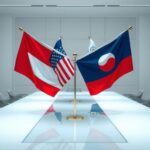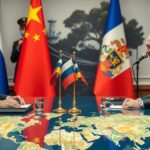Politics
ALEXANDER GABUEV, COLUMBIA UNIVERSITY, DONALD TRUMP, EAST ASIAN INSTITUTE, ELIZABETH WISHNICK, EUROPE, EUROPE/ASIA, FOREIGN POLICY, GEOPOLITICS, INTERNATIONAL RELATIONS, KYIV, MOSCOW, NIXON, PUTIN, RICHARD NIXON, RUSSIA, RUSSIA-UKRAINE WAR, STIMSON CENTER, TRUMP, UKRAINE, US-CHINA RELATIONS, VLADIMIR PUTIN, WEATHERHEAD, YUN SUN
Omar El-Sharif
Trump’s Pivot to Russia: Impacts on China-Russia Relations
President Trump’s recent pivot towards Russia is altering Moscow’s ties with China but is unlikely to fracture their strong partnership. Analysts suggest that this shift may mitigate Russia’s dependence on China and influence their level of cooperation. The ongoing Ukraine conflict continues to reinforce China’s and Russia’s ties amidst the backdrop of US diplomacy.
US President Donald Trump’s recent shift in stance towards Russia is set to reshape Moscow’s relationship with China. While analysts believe it is unlikely to disrupt the strong partnership between Russia and Beijing, it will inevitably influence their dynamics. Following his inauguration, President Trump has been working to reverse the Western opposition to Russia’s invasion of Ukraine, aiming for a deal favorable to Moscow. This pivot may lessen Russia’s reliance on China, according to experts.
Yun Sun from the Stimson Center noted that Russia’s diplomacy has been constrained during the Ukraine conflict, but improved relations with the US could expand its international positioning. Meanwhile, China has maintained a neutral stance, advocating for peace talks while significantly boosting economic and military collaboration with Russia. The prior US administration criticized Beijing for not taking a stronger role in resolving the conflict.
Some analysts refer to Trump’s realignment as a “reverse Nixon” moment, contrasting it to Richard Nixon’s historic visit to China in 1972, which altered the geopolitical landscape significantly. However, this comparison is deemed flawed; today’s China is a global powerhouse, unlike the isolated China of Nixon’s era. Thus, Russia is unlikely to attempt to distance itself from China amid their strong ties and shared interests.
Experts like Alexander Gabuev assert that Russia will not seek to jeopardize its relationship with China given their intertwined economic and strategic interests. The United States, while unable to dismantle the Russia-China partnership, could influence the quality of their cooperation. In addition, the recent communication between Xi Jinping and Vladimir Putin highlights the ongoing reinforcement of their alliance.
China’s optimal scenario would involve Russia maintaining gains in Ukraine while reintegrating into the international community, which could embolden China’s territorial ambitions, especially regarding Taiwan. Zhao Long emphasized that China could facilitate dialogue among conflict parties and rally support for peacekeeping efforts post-conflict. This would enhance China’s role in the reconstruction of Ukraine and signify its global influence.
In summary, President Trump’s unexpected pivot towards Russia is reshaping geopolitical dynamics, though it is unlikely to fracture the established ties between Russia and China. While the US may influence the nature of this partnership, both nations maintain overlapping strategic interests that prevent a significant realignment. As the situation evolves, China’s involvement in peace negotiations and post-war reconstruction efforts reaffirms its prominent role in global politics.
Original Source: www.kten.com








Post Comment